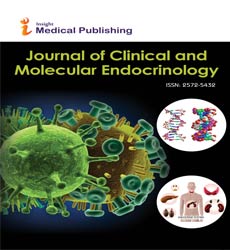Abstract
Ram Sperm DNA Fragmentation under Hyperglycemia conditions is Inhibited by Polyamines
Objective: To evaluate the in vitro effect of the polyamines spermine, spermidine and putrescine on the epididymal ram sperm DNA under hyperglycemia conditions.
Methods: DNA was isolated from ram epididymal sperm. Purity and integrity of DNA, and the effect of polyamines were analyzed by UV spectroscopy and agarose gel electrophoresis. Vials containing 200 g DNA with or without 10 mm polyamine solutions were incubated at 35°C for 30 or 180 days in the presence of 5.5 or 30 mm glucose, simulating normal and hyperglycemia conditions.
Results: Seen by the increase in chromicity at 260 nm, epididymal sperm DNA was glycated from 30 days of incubation with 30 mm glucose. The absorbance was increased 65.44, 91.59 and 21.86%, for sperm DNA from head, body and tail, respectively. When polyamines were added, sperm DNA was condensed and chromicity decreased. The hypochromicity induced by polyamines was greater for the sperm DNA from the body of the epididymis. The effect of the polyamines from highest to lowest was: Spermine > spermidine > putrescine. Electrophoresis analysis revealed that the epididymal sperm DNA was fragmented after 180 days of incubation not only with high glucose concentration but also with physiological concentration. DNA fragmentation was partially inhibited by polyamines, especially by spermine and spermidine, to a lesser extent by putrescine.
Conclusion: These results provide evidence that high glucose concentration such as 30 mm glucose causes epididymal sperm DNA glycation and fragmentation. Both processes were partially inhibited by polyamines. The protective effect of polyamines is a function of their polycation properties as show for spermine and spermidine.
Author(s):
Mendez JD, Sauer-Ramírez JL
Abstract | Full-Text | PDF
Share this

Google scholar citation report
Citations : 120
Journal of Clinical and Molecular Endocrinology received 120 citations as per google scholar report
Abstracted/Indexed in
- Google Scholar
- China National Knowledge Infrastructure (CNKI)
- Publons
- Secret Search Engine Labs
Open Access Journals
- Aquaculture & Veterinary Science
- Chemistry & Chemical Sciences
- Clinical Sciences
- Engineering
- General Science
- Genetics & Molecular Biology
- Health Care & Nursing
- Immunology & Microbiology
- Materials Science
- Mathematics & Physics
- Medical Sciences
- Neurology & Psychiatry
- Oncology & Cancer Science
- Pharmaceutical Sciences

